
by juliegd | Nov 14, 2016 | 2016, Europe, Guest Post, Portugal
 I am Portuguese. My parents and grandparents are Portuguese. My partner is Portuguese and his parents and grandparents are Portuguese. Both my children are Portuguese. Yet, I do not fit in my own country, Portugal, especially as a mother.
I am Portuguese. My parents and grandparents are Portuguese. My partner is Portuguese and his parents and grandparents are Portuguese. Both my children are Portuguese. Yet, I do not fit in my own country, Portugal, especially as a mother.
Despite being Portuguese, my childhood years were spent abroad and at international schools. I celebrated Halloween when it wasn’t popular here yet, and I loved Thanksgiving dinners. My views of the world have always been interwoven with different cultures and customs. I expected to fall in love with a foreigner and have a multicultural family and lifestyle. Fate gifted me instead with a Portuguese man with a huge heart and an incredible open-mindedness. That combination steers me away even further from the traditional mindset of the Portuguese. Being 100% Portuguese, I am somewhat labelled “alternative” or “hippie”.
To start with, my children have unusual names – Giani and Noah. My partner and I had to browse a 400-page list of authorised names until we found Giani. In Portugal, names have to be authorised by the state, so you either pick one from the list or you submit a request. We did not opt for a traditional Portuguese name like Martim or Francisco or a trendier one like Benjamim. When asked about my children’s names, the second question is “So, your husband is… Italian? British, perhaps?”. No, my partner is Portuguese and we just decided on a different name. That’s a strange concept in this country, so I am automatically labelled as an “alternative mother”. In fact, names represent the social or economic status of the parents.
When my son was six months old and started eating solid food, I went the usual, traditional route recommended by the paediatrician: pureed fruits and veggies. My super calm and laid-back child turned into a monster as soon as he would see the spoon approaching his mouth. I dreaded mealtimes. The paediatrician’s suggestion was to force it in him because he needed the nutrients. That did not sit well with me so I stopped feeding him, offering him breastmilk exclusively while searching online for an answer. Baby-led weaning was the answer and it seemed very natural to me. My son soon began to devour steamed broccoli, potatoes and carrots. I also began potty training him at eight months old. These options were completely frowned upon by the paediatrician and my more traditional friends thought it was strange. Some thought I was endangering my child. Some thought I was crazy. At the time, I didn’t have so-called hippie friends so I really had no one other than my partner to truly support me.
Until my son was about six months old, I felt insanely lonely. All my friends were either single or had no children. By chance I ran into a friend from one of the international schools I attended in Lisbon and she introduced me to a weekly playgroup organised by international, expat mothers. I started attending with my son and it was delightful to be around so many different mothers who were all naturally open to different views towards child-rearing.
Socialising in Portugal the standard way is extremely hard and frustrating for me. Most of our couple friends with children have a very busy schedule during the weekend, shuffling between in-laws. We see them at birthday parties. If the couple has one child, we will socialize with them once a year, if they have two, we will socialize twice and so forth. I miss the spontaneity and openness of my international friends when I lived abroad. I miss sharing cultures (celebrating Thanksgiving, Halloween, Easter, etc.) and creating a community with friends.
I feel this sense of being foreign in my own country almost on a daily basis. I leave the park when the Portuguese mothers arrive, my children’s mealtimes are almost at the same time as their afternoon snack, and my children go to bed much earlier than the standard time.
The more traditional friends find my views strange and consider me a hippie and I find the views of my “alternative” friends a bit too extreme for me. So, I sit in the middle, on a tiny island. Fortunately, I found a group of international mothers and fathers, all with different backgrounds and origins, where I fit in perfectly. I am able to enjoy my “Portuguese-ness” subtly without any pressure. I take comfort in knowing that I am now part of a community, a small family. We meet up regularly and I am accepted without labels. I am not a hippie, I am not Portuguese – I am just the mother of two sons with non-Portuguese names who speaks Portuguese perfectly.
If you’re an expat, have you ever felt this way when coming home?
This is an original post for World Moms Network written by guest poster, Sofia Caessa, in Portugal.
Sofia Caessa grew up by the canals of Overschie, the Netherlands, the skyscrapers of São Paulo, Brazil and the beachs of Cascais, Portugal. Her love for Theatre took her to New York City, where she intended to pursue a career in Theatre. Instead, she became involved in Film and writing. After a few years in the USA, Sofia decided to move back to Europe. In Brussels she worked for Violeta Lab, a cultural organisation she founded, and in film production. There, she founded the Little Film Academy. Now living in Portugal, Sofia is the mother of two boys and works at Lêleh Land, a creative space that fosters imagination, free play, exploration and discovery. She also has a blog, Mami Coração, where she shares homemade activities for children, and homemade natural products.
Julie, her husband and baby boy are currently living in Portugal, having spent the previous three years in the southeast of Brazil.
She considers herself a bit of an obsessive reader, and even more so since discovering she was pregnant. All that information has to go somewhere, which is why Julie started her blog, happy mama = happy baby, where she documents all the quirky parenting ideas she has collected so far.
More Posts - Website
Follow Me:



by World Moms Blog | Aug 2, 2016 | 2016, Economy, Europe, Guest Post, UK
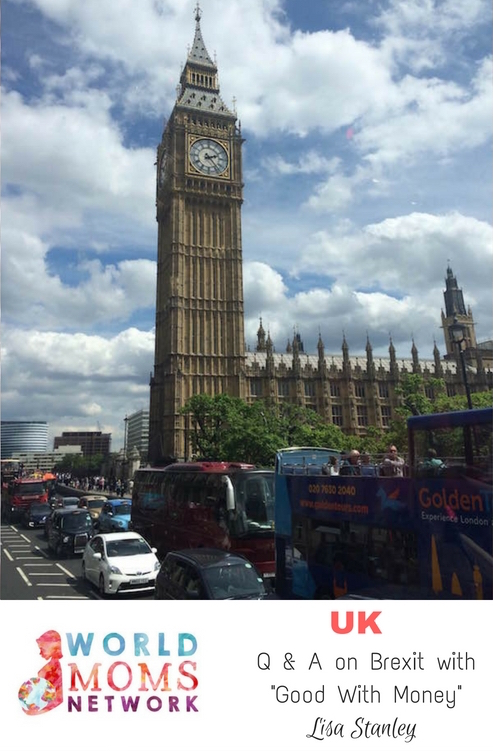
Brexit. The news is everywhere. How does this affect families in the UK and around the world? We called on our friends (literally, they are friends with Jen Burden’s sister-in-law!), “Good with Money” in Great Britain, a site launched by two moms who provide financial information and inspiration for families, to get their perspective from inside the UK!
What is Brexit (the short version!)?
Brexit. A week or so before the EU referendum I was in the playground with my youngest son. An elderly Chinese man looking after his grandson started up a conversation. I could just about understand his English. His comment was, basically,
“What on earth are you doing, Britain, holding a referendum on whether to leave the EU or not? Are you mad?’” Well, clearly, we are.
The UK woke up on the morning of 24 June, many of us in utter disbelief on realising 52 per cent of the country had voted to isolate our tiny island kingdom and leave the European Union. The EU currently has 28 member states, a combined population of more than 500 million, a combined GDP of more than US$18bn and an internal single market governed by its own laws. The UK joined the precursor of the EU, the European Economic Community, in 1973. So to answer the Chinese grandad, yes, we are mad, we held the referendum, and (gulp) we voted leave.
And, if that was not enough madness in itself, we’ve since seen the Prime Minister at the time, David Cameron (Remain), who called the Referendum somewhat as an election winner, resign. The two main Leave campaigners, Boris Johnson and Nigel Farage, also resign (from the resulting Conservative Party leader election race and as leader of the UK Independence Party respectively). The other key UK political party, Labour, remains in turmoil with a leader, Jeremy Corbyn, refusing to step down despite more than half of his ministers resigning just after the vote. AND…we’ve still not really heard a peep from the Greens or the Liberal Democrats (who led our coalition government between 2010 and 2015). The only person with any sense saying anything with any sense is the Governor of the Bank of England, Mark Carney, who is Canadian!! (Read our latest on that here.) And current Prime Minister Theresa May, who voted Remain, vows to follow the will of the people after the vote to Leave.
Leave or Remain, there is no averting the harsh lesson we are now getting in how that abstract and amorphous “economy” deeply affects our personal lives and society both close to home and further afield.
They say nothing is certain in life except death and taxes. Well, in the two weeks after the vote, I’d say that’s been proven, and one million times over. Previous certainties about jobs and the employment market, freedom of movement, house prices, household bills to loan rates and other personal finances have all been thrown upside down, topsyturvy.
And one of the worst things is that some of those who are most likely to have voted Leave – the disaffected and disenfranchised – will now be among those most negatively affected by the country’s decision.
We will ALL be affected, and in far more subtle and profound ways than just how much our mortgage bill or rent goes up, as the impact of the financial crisis proved. Following the shock of 2008, higher house prices resulted in an increase in the age at which people get married and have children; the huge public deficit resulted in more people working into retirement and young people who can’t get jobs have to live with their parents for longer. More of the same again cannot be ruled out.
Despite the crazy turmoil at Westminster and in the City of London, a lot of clever people are working out how to protect us from Brexit’s illest effects. Lower interest rates and money printing are on the cards. These strategies might be a recipe for everliving debts and poor retirements, but they will buy us time.
What are the top 3 effects on the world economy after the Brexit vote to leave the EU?
The effect on the UK economy has been, understandably, pretty pronounced. There are apparently 700,000 fewer jobs advertised in Britain since the Leave vote. Across the globe, too, markets were rocked and currencies in freefall, although they have since recovered.
Almost two weeks after the vote, the British Pound had hit another 31 year low, and it still remains well below its pre-Brexit value over one month later. There is talk of it reaching parity with the US Dollar before the end of the year. Good news for tourists visiting the UK, but not, generally, for many others.
Meanwhile, inflation, made worse by the falling Pound making imports more pricey, looks set to increase. But by how much? A few spikes notwithstanding, inflation has been fairly low for a number of years. Now, economists predict it could more than double before the end of the year, rising to as much as 4 per cent next year.
In the UK we import 60 per cent of our goods - that’s a lot, hey? So what do we do if our EU or even global trade agreements are not (re)negotiated fairly? That’s a lot of stuff to miss if our friends in Europe no longer choose to sell it to us at favourable rates. Say au revoir to affordable Mozzarella, Balsamic vinegar, Feta cheese… blimey, this could even spell the death of our beloved Prosecco habit!
The GBP has seen a devaluation. What are some of the challenges this presents for families in the UK and abroad?
As soon as the Leave vote was announced, the British Pound slumped to its lowest level against the US dollar in 31 years. Almost two weeks later, it fell yet further, to new 31 year lows. It has also tumbled against the Euro. Despite a growing chorus of positive voices, this still makes for pretty hard reading.
It means British families with holidays booked to Europe, the US, or even elsewhere, are going to find it pretty tough going, financially.
With the Pound worth less than it was a month ago, everything is going to seem almost unstomachably expensive. So, those Brits who’ve yet to book a holiday will most likely see the summer of 2016 as their Staycation year, keeping the money closer to home. UK resorts should do well from British travellers, and they should also do well from an influx of visitors from around the world making the most of a cheap Pound.
More worryingly, perhaps, the 4.5m British families living and working overseas (with 1.4m in the EU according to the UN) are in limbo, wondering for how long they will be able to stay, and suddenly finding everything significantly more pricey.
While some in the Leave camp argued prior to the vote that Britain would be able to carve out a fuller role in foreign aid outside of the EU and would be able to develop broader international political alliances, such as with former Commonwealth countries, there’s still scant evidence emerging that this will be the case. (Frankly, there’s little evidence of anything emerging, on any future matters at all, eeek!) In fact, a number of leading names in international aid such as Oxfam, WWF, Christian Aid, ActionAid and Save the Children, signed a letter pre Brexit stating their view that only by remaining in the EU can Britain extend its reach and influence when tackling global humanitarian crises such as Syria, Middle East and north Africa.
Britain currently spends 0.7 per cent of gross national income on foreign aid, with the official budget rising to £12.2bn. The signatories of the letter said: “Every pound of aid the UK spends through EU institutions is matched by £6 from other member states. This larger pool delivers better lives for the poorest people. It also helps tackle problems in areas where the UK has no large presence. EU aid complements activities that other aid agencies cannot undertake, like police and security missions in fragile hotspots.”
So, much as those Brits living and working abroad are likely to suffer, people from developing countries who work in the UK will also be hit, as the value of what they have to send home falls further.
Will the UK’s exit from the UK make it more difficult for EU members to work in Britain and vice versa?
The jury’s still out on whether it will be more difficult for people from EU member states to work in Britain and Brits to continue working across the EU. Although I am very happy in Britain (even if it still feels a bit like a rather rudderless, possibly sinking, ship at the minute). I did find myself embracing my Irish roots (my mother is Irish) when I woke up on 24 June, the thought of wanting my kids to have the same European freedom of movement I’ve been lucky enough to have, if they so wish. I heard a rumour they’ve shut the Irish passport office though, so too late for me!
What is your top practical financial advice for families everywhere?
If like many of us in the UK British, European, African, American, Asian, etc., you find yourself wondering w h a t t h e h e c k t o d o n o w , we’ve come up with a few post Brexit ‘keep calm and collected’ financial tips:
- Consider switching your energy supplier. Homegrown renewable energy is less sensitive to price volatility and kinder to the planet.
- Check your savings balances. Up to £75,000 deposits are covered by the Financial Services Compensation Scheme; the EU deposit guarantee limit is Euro 100,000.
- Analyse your everyday spending to guard against too much vulnerability to further falls in the Pound.
- Hold off buying foreign currency. (Or see it as a chance to change all those Dollars and Euros hiding in drawers and down the back of the sofa back into Pounds!)
- Consider fixing your mortgage. Yes, rates are tipped to fall, but there may be short term volatility and fixed rates are superlow at the moment
- Go local, buy local. Support the local economy, it’s going to need it.
- But go global, too. Investors should ensure their portfolios are globally diversified and denominated in several currencies, not only the Pound.
You could also check out our Positive, Practical and Principles Good with Money tips to get your family finances back on track post-Brexit.
For more on the financial effects of Brexit and more, Lisa and Becky can be found providing financial tips for families in the UK at Good with Money.
This is a guest post to World Moms Network by Lisa Stanley in the UK of Good with Money. (Thank you, Lisa!)
Photo credit to Jennifer Burden.
World Moms Blog is an award winning website which writes from over 30 countries on the topics of motherhood, culture, human rights and social good. Over 70 international contributors share their stories from around the globe, bonded by the common thread of motherhood and wanting a better world for their children.
World Moms Blog was listed by Forbes Woman as one of the "Best 100 Websites for Women 2012 & 2013" and also called a "must read" by the NY Times Motherlode in 2013. Our Senior Editor in India, Purnima Ramakrishnan, was awarded the BlogHer International Activist Award in 2013.
More Posts

by World Moms Blog | May 2, 2016 | 2016, Guest Post, South America, World Interviews, World Voice
In the aftermath of the recent earthquake in Ecuador, the people of my husband’s home country are on our minds and in our hearts, and we are very much in touch. Today, I am giving them a voice on World Moms Blog…
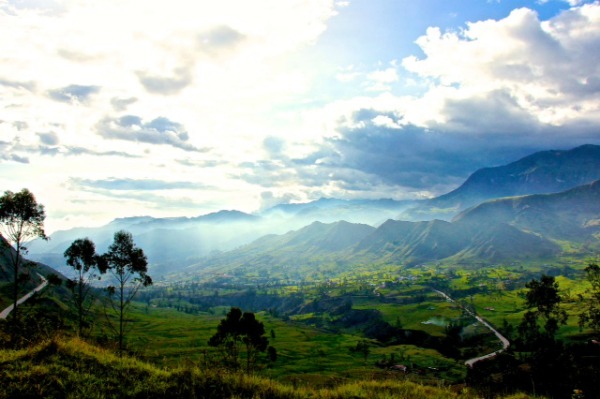
Beautiful Ecuador. A photo from the hacienda belonging to my husband’s family in Cuenca.
Ecuador is the home of the Galapagos Islands, aromatic coffee, delicious chocolate, and my husband. He was born and raised in Cuenca, a charming colonial city in the mountains. Although we reside in the United States with our two children, my husband always makes it a point that we always stay connected to the place he still refers to as home. We got engaged on his hacienda (family’s land), honeymooned in the Galapagos Islands, and continue to vacation in Ecuador every year. My children love visiting with their abuela and primos and enjoy all the natural splendors that their father’s home country has to offer. Ecuador is always very much in our minds and in our hearts.
So, on April 16th when we heard the news that a 7.8 magnitude earthquake hit the country, we were a little rattled ourselves.
We learned that my husband’s family was safe, and although they were over 200 miles away from the epicenter they felt the tremors of the quake. They explained that the ground thunderously shook for over a minute, rattling chandeliers and unhinging doors. It was like nothing they had ever experienced before.
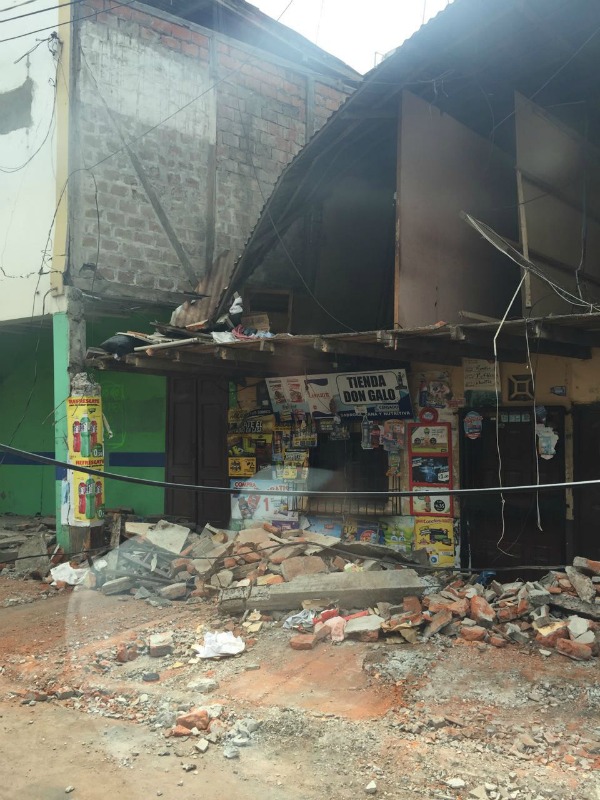
What remains of a gift shop in Manta, Ecuador after a series of recent earthquakes recently in April 2016. Manta is Ecuador’s largest seaport on the Pacific ocean.
The epicenter was located in the coastal region of Ecuador, which includes some port cities, picturesque coastal towns and small fishing communities. Buildings crumbled to the ground, over 600 people were killed and thousands were displaced from their homes. Most of the area impacted is very poor with limited infrastructure, most of which was destroyed. Initial efforts focused on emergency response and rescue. Organizations like the Ecuadorian Red Cross (Cruz Roja Ecuatoriana) along with other civil and governmental organizations were mobilized quickly.
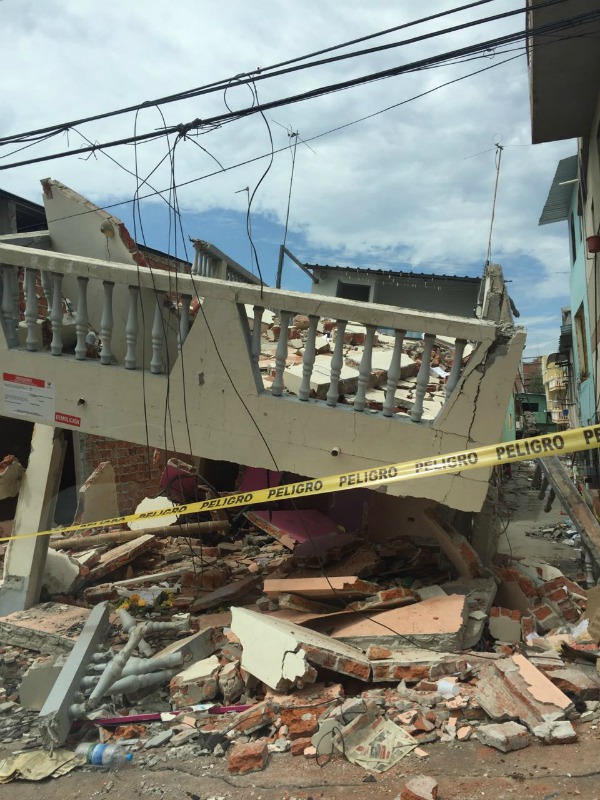
Yellow tape marked “Peligro” warns people of danger after the roof and balcony collapse of a building in Manta, Ecuador after the earthquakes in April 2016.
Based on my experience, this is a small and proud country. People boast about everything Ecuadorian including their fruit, wildlife, history and rich traditions. During this difficult time, they have pulled together to help their fellow compatriotas.
My husband’s family helped stock a mobile hospital that headed to the area immediately after the quake to provide emergency health care. Others provided food, clothing and basic essentials. In the days following the earthquake it became clear that the needs of the people were growing and that the rebuilding process was going to be slow. Access to clean water has become critical. Imagine not having safe water to drink or cook?
Once again, local families and companies in the surrounding areas joined together to provide water treatment equipment to service a small portion of those affected. They are making steps forward, but it’s still a long road ahead. There are many organizations that are still offering assistance in the area, according to our family there. One of them is Oxfam, which is working with the Ecuador government to provide safe water and storage to the area. The organization is also focusing on sanitation measures to prevent water borne diseases, especially among children and senior citizens. My family in Ecuador has seen Oxfam’s work on the ground and asked us to donate. We, in turn, are helping to spread the word.
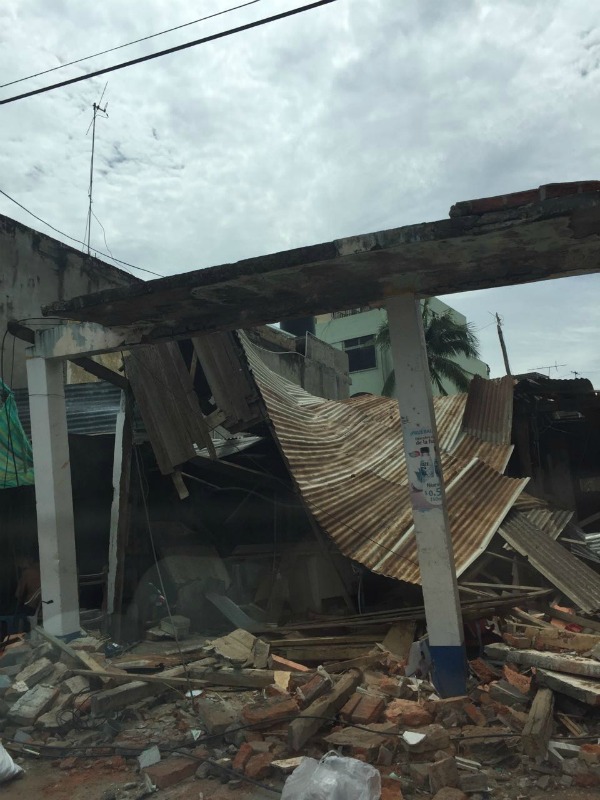
A collapsed and bent tin roof and damaged building supports lean atop brick rubble in the aftermath of the earthquakes in Manta, Ecuador last month, April 2016.
The phrase si se puede is a phrase that enthusiastic Ecuadorian sports fans chant to support their teams. It means “yes, we can.” This phrase has become the motto of the relief efforts.
From the hearts of my family and the people of Ecuador who are in dire need of clean water in the aftermath of the earthquake, please consider donating to Oxfam to help the people of Ecuador see that the country’s chants of “si se puede” will overcome this natural disaster.
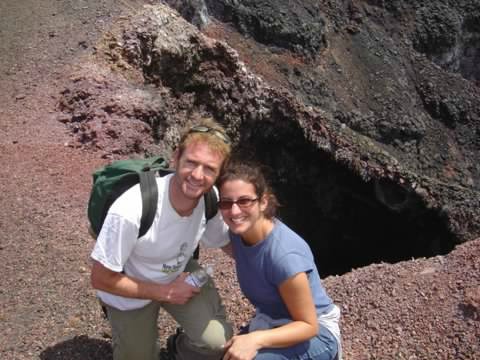
Angela and her husband on honeymoon in the Galapagos Islands, Ecuador after they first married in her husband’s home country 10 years ago.
This is an original guest post from a World Moms Blog reader, Angela Vega, who is mom in the USA of two sensitive and curious children who keep her very busy. Before deciding to stay home with her children, Angela worked in the field of marketing and advertising. She earned an undergraduate degree from Villanova University and an MBA from Thunderbird School of Global Management, where she met her husband.
Photo credits of the earthquake damage and hacienda to Pedro Vega on the ground in Ecuador.
Photo credit to the author for the honeymoon photo.
World Moms Blog is an award winning website which writes from over 30 countries on the topics of motherhood, culture, human rights and social good. Over 70 international contributors share their stories from around the globe, bonded by the common thread of motherhood and wanting a better world for their children.
World Moms Blog was listed by Forbes Woman as one of the "Best 100 Websites for Women 2012 & 2013" and also called a "must read" by the NY Times Motherlode in 2013. Our Senior Editor in India, Purnima Ramakrishnan, was awarded the BlogHer International Activist Award in 2013.
More Posts

by World Moms Blog | Nov 24, 2015 | 2015, Girls, Guest Post, Health, Middle East, Refugees, World Moms Blog, World Voice
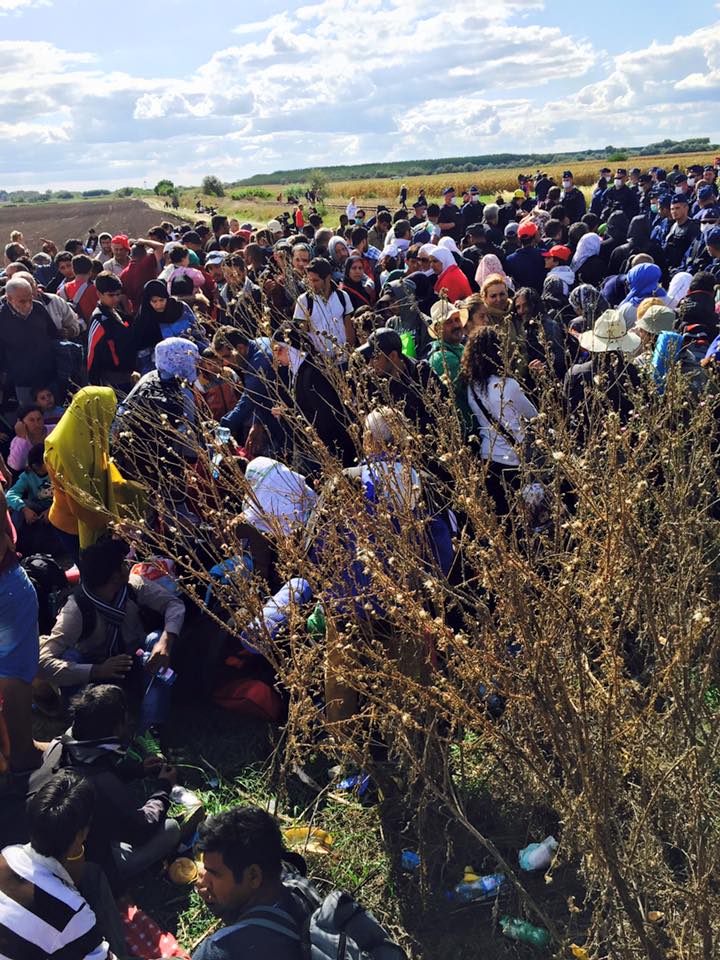
Photo Credit: Jennifer Lovallo
What would you take with you if had to leave at a moment’s notice? Other than the clothes on my back and possibly some photos of my family, there would be nothing else that I would carry with me. For those fleeing dangerous situations, as in the case of Syrian refugees, so much emphasis is placed on the welfare of men and children, but what about the needs of women, especially when it involves their hygiene?
In Essex, England, three women are making a difference in the lives of Syrian women with regard to this issue. Helen McDonald, Megan Saliu and Helen Pudney founded SOS Calais, or Supporting Our Sisters in Calais. Together they organized drives to collect sanitary pads and had them delivered to the one of the biggest refugee camps in Calais, France where women make up 10% of the population. Donating food, water and personal products are just as necessary, but for women, menstrual products are crucial.
For most women, menstrual products are easily accessible, but for women who have been displaced due to crisis situations, access is virtually impossible.
In addition to access, there is the question of safety for these women. The women McDonald, Saliu and Pudney encountered in Calais were in their twenties and outnumbered by men in the same camp. These women are forced to look out for themselves to avoid harassment due to minimal or no security or support for them otherwise. Providing these women with products specifically for them gives them a sense of inclusion and empowerment.
For someone like me who has experienced moments of embarrassment or horror for not having sanitary pads when I’ve needed them, it’s quite disconcerting to know that these women are forced to find alternative means to take care of their needs, especially with menstrual products. It is an unfortunate byproduct of being torn from one’s home or country as a result of war or oppression and it is unrealistic to think that women and children are less affected than men.
Women in these environments become targets as a way to weaken their resolve in achieving independence and have to rely on others for help or do without. With the crowdfunding page created by McDonald, Saliu and Pudney, they intend to raise awareness of how crucial it is to provide these women with their needs. It is up to us, and the rest of the world, to step up and ensure that everyone, especially women in crisis environments, get their needs met. It’s the least we can do for them and future generations.
Read the original article that inspired this post, and find out more about this fundraising effort, and how you can help.
What other basic needs would you have if you had to flee on short notice?
This is an original guest post written by Tes Silverman for World Moms Blog.
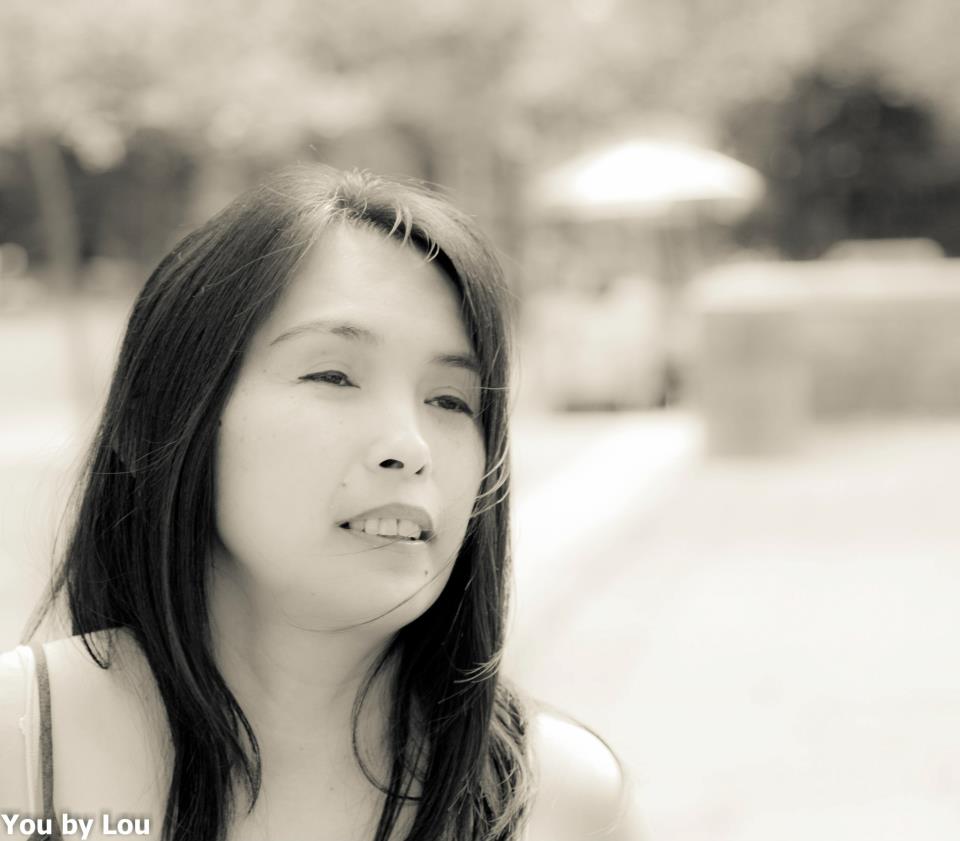 Tes Silverman was born in the Manila, Philippines and has been a New Yorker for more than 30 years. Moving from the Philippines to New York opened the doors to the possibility of a life of writing and travel. Before starting a family, she traveled to Iceland, Portugal, Brussels, and France, all the while writing about the people she met through her adventures. After starting a family, she became a freelance writer for publications such as Newsday’s Parents & Children and various local newspapers. Four years ago, she created her blog, The Pinay Perspective. PinayPerspective.com is designed to provide women of all ages and nationalities the space to discuss the similarities and differences on how we view life and the world around us. As a result of her blog, she has written for BlogHer.com and been invited to attend and blog about the Social Good Summit and Mom+Social Good. Currently residing in Huntington, NY with her husband, sixteen year-old daughter and nine year-old Morkie, she continues to write stories of women and children who make an impact in their communities and provide them a place to vocalize their passions.
Tes Silverman was born in the Manila, Philippines and has been a New Yorker for more than 30 years. Moving from the Philippines to New York opened the doors to the possibility of a life of writing and travel. Before starting a family, she traveled to Iceland, Portugal, Brussels, and France, all the while writing about the people she met through her adventures. After starting a family, she became a freelance writer for publications such as Newsday’s Parents & Children and various local newspapers. Four years ago, she created her blog, The Pinay Perspective. PinayPerspective.com is designed to provide women of all ages and nationalities the space to discuss the similarities and differences on how we view life and the world around us. As a result of her blog, she has written for BlogHer.com and been invited to attend and blog about the Social Good Summit and Mom+Social Good. Currently residing in Huntington, NY with her husband, sixteen year-old daughter and nine year-old Morkie, she continues to write stories of women and children who make an impact in their communities and provide them a place to vocalize their passions.
World Moms Blog is an award winning website which writes from over 30 countries on the topics of motherhood, culture, human rights and social good. Over 70 international contributors share their stories from around the globe, bonded by the common thread of motherhood and wanting a better world for their children.
World Moms Blog was listed by Forbes Woman as one of the "Best 100 Websites for Women 2012 & 2013" and also called a "must read" by the NY Times Motherlode in 2013. Our Senior Editor in India, Purnima Ramakrishnan, was awarded the BlogHer International Activist Award in 2013.
More Posts
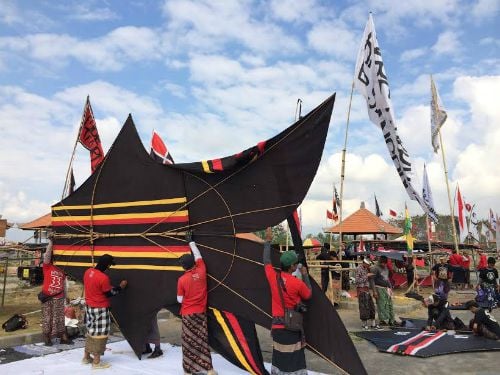
by World Moms Blog | Sep 8, 2015 | 2015, Asia, Guest Post, Indonesia, World Motherhood
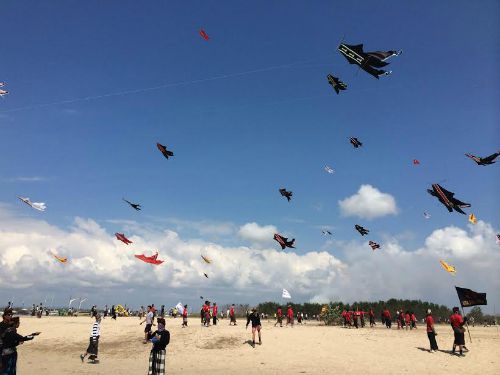
Dry season on the island of Bali brings along some really strong winds; the whistling, tree bending kind. It’s still extremely hot, but at least the afternoon winds are refreshing, making it the perfect conditions for kite flying season.
This year I promised the kiddos that I would get them a kite to fly in the park. I found a little shop close to the school that sold some inexpensive kites in the shapes of dragonflies. I bought a red, black and yellow one and took the kiddos to the Lapagnan Puputan Park after class. In fact, the lady that sold me the kite spoke to me in her native Indonesian and said the kite was 15 thousand rupiahs, but I understood 50 thousand. Thankfully, she was kind enough to chase after me with my change when I had already walked away with the kite. Expat life…
The winds were so strong that it really was not that easy. Unfortunately, our string wasn’t a full constant thread but had a knot tying two pieces together. It didn’t take long for it to break with the wind. Big Kiddo decided to run while holding the kite and he had a better time of it. On that note, next is a photo from a much more successful kite flying attempt he had with his father weeks prior by the ocean. Check out his airplane kite!
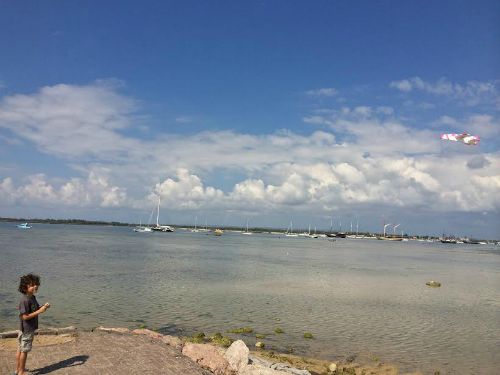
We love seeing the kites everywhere, out the windows of our house and when we drive somewhere the kiddos always find new ones with beautiful colors and start counting how many owl shaped ones or how many fish ones they see on a trip somewhere.
Kite flying in Bali is not just a pastime for the kids; it is a cultural and religious phenomenon that takes over life itself for the entire dry season.
Between May and September, the sky is spotted with kites, of all sizes and colors; many are as far away as a kilometer it would seem (I’m sure it’s not that far up, but it feels like that).
Everywhere you look there are kids flying small kites, in parks and beaches there are groups of men flying giant kites, on the sidewalks kids making kites out of sticks and plastic bags.
There is no piece of sky untouched by a kite on a string. You may even trip on one if you aren’t paying attention. If the winds are good, the kids will tie their kite to a rock or tree and play ball while it flies.
Why are kites so important in Bali?
Kites are seen as an offering to the gods, a fun way to appease the demons, and good old competition. All with the hopes of having a successful harvest that year.
Apart from the kites for children, there are ceremonial kites that can be so big they need teams of 10 men to fly. They come in different combinations of red, black and white.

Every August, the village of Sanur holds a kite flying competition on the beach. There are three different categories, the classic fish shape kite, kites with a tail that can be as long as a 100 meters, and “new creation” kites which are usually animals or other crazy constructions.
Every team of kite fliers has flyers, flag bearers, and Gamelan musicians to accompany the flying of the kites. The competition consists of points for best launch, height of flight, length of flight and amount of control. Kudos for the kites that don’t fall to the ground!
Made with very thin cloth sewn onto bamboo sticks, the traditional fish-shaped kite is the kind that the kids learn to make at school with pieces of plastic bags. Once the kites are ready to be taken somewhere to fly, be it for the competition or for practice, the flying teams pack up the kites together on a truck, stopping traffic for almost an hour. Whenever we run into one, the kiddos love seeing what kinds of kites are being packed on the truck.
Given my own attempts at kite flying, perhaps next time we’ll just enjoy watching the experts!
This is an original guest post to World Moms Blog by Orana Velarde of Bali, Indonesia. She can be found on her blog, Crazy Little Family Adventure.
Photo credits to the author.
World Moms Blog is an award winning website which writes from over 30 countries on the topics of motherhood, culture, human rights and social good. Over 70 international contributors share their stories from around the globe, bonded by the common thread of motherhood and wanting a better world for their children.
World Moms Blog was listed by Forbes Woman as one of the "Best 100 Websites for Women 2012 & 2013" and also called a "must read" by the NY Times Motherlode in 2013. Our Senior Editor in India, Purnima Ramakrishnan, was awarded the BlogHer International Activist Award in 2013.
More Posts

by World Moms Blog | Aug 20, 2015 | 2015, Asia, Culture, Guest Post, India, Pregnancy, World Motherhood
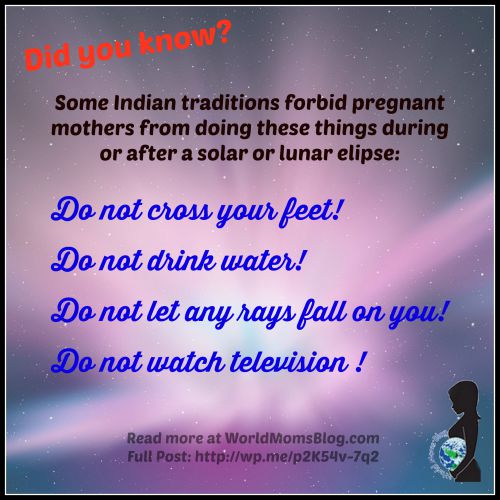
Total Eclipse of My Pregnancy
In India, some say the most awesome time of any woman’s life is when they get pregnant. You have life in your body, share all that you feel and have lots of company. This is also a time when you will have your husband doing everything thing for you, provided you ask for it. However, if you happen to be a woman who has a pseudo ego of being self reliant and who has never asked for many favours in life, this is not a comfortable time. This was me.
Looking back, it was silly not to have taken advantage of the help of my husband and my extended joint family including, my mother in law, co sister, their respective husbands and their daughters, all of whom I still live with. It’s true. We, Indians, live like this with lot of people to give us company all the time. We hate and love them simultaneously.
I wanted to be so self reliant that I never wanted them to cook anything special for me!! Not even once during my all nine months. I made it to term although my whole extended family wanted me to deliver my child as early as possible, probably in the first month!! They were just too excited to welcome a new member in the house and extend the extended family a little more. It had been 18 years since our family had the chance to welcome new cute baby!
However, their enthusiasm was a little too overwhelming, as even my doctors suggested mildly to get a C section done after I crossed 36th month. My family had become restless and could not wait. As a mother I was excited to meet my baby, too, but I wanted my child when the time was right. Not early and not late. And, I adhered to that. I did not succumb to any pressure.
Well, ok, I was strong except for when it came to my aunties…
During my pregnancy, thrice I received calls from my frantic, superstitious aunties who in their whole life had never ever called me before. They began to instruct me to observe precautions embedded in our ancient culture and told me not do certain things. It was clear that if their precautions weren’t heeded following and during a solar or lunar eclipse, my child and I would be harmed. There was no scientific proof, of course! Here are some of the things they demanded of me during an eclipse:
Do not cross your feet
Sit in one position
Do not use scissors, knife or blade
Do not stitch
Do not drink water
Do not let any rays fall on you
Sit in only one room, close the door
Do not watch television
In short, it was total eclipse of my pregnancy!! Every year, lunar or solar eclipses do happen. But if you are pregnant, they say it can harm you more than the normal people. I never quite understood whether pregnant women carry any special energy around them. Or do eclipses have special power to judge human beings? Oh she is pregnant I will harm her; oh she is women I will harm her less and this is unborn child I can harm even more.
Only Indian pregnant women will get affected by eclipses and no one else on this planet. I did bow down to the pressure. I did stay home and did exactly what was told to me, though with no personal faith but to please everyone around me. Oh, I did not want anything to go wrong with my unborn baby!
The pregnant women are strictly advised not to venture out during eclipse. It is still believed by lot of people in India that if you do anything prescribed above, your baby might become handicapped or disabled and the probability of miscarriage is increased. If you stitch cloth your child may have cleft lip. It is funny and there is no scientific explanation to all these. And there is no proven fact that it can actually cause harm. However, looking at a solar eclipse with naked eyes can harm your eyes irrespective of you being pregnant or not pregnant.
For millions of years humans have given birth and been pregnant along with other species during the time when there happened to be an eclipse. It is improbable that an eclipse can cause a direct negative impact by singling out pregnant women. There are many children who are born with a disability and cleft lip in-spite of following all of the “rules”. So, since there is no scientific explanation and eclipses do not have special power to differentiate, between whether you are Indian or not, do not get carried away! I complied with these instructions from my superstitious aunties during my pregnancy to keep everyone happy. The best thing to do? Take medical advice and do not panic.
What about you? Did you receive any advice unique to your culture when you were pregnant?
Or, did you find yourself doing something you didn’t believe in while pregnant just to please others? Let’s hear it!
This is a an original guest post to World Moms Blog by Vineeta Jain of Kolkata, India. Vineeta is an award winning media professional specializing in radio. And she did not hold any scissors while pregnant during an eclipse!
World Moms Blog is an award winning website which writes from over 30 countries on the topics of motherhood, culture, human rights and social good. Over 70 international contributors share their stories from around the globe, bonded by the common thread of motherhood and wanting a better world for their children.
World Moms Blog was listed by Forbes Woman as one of the "Best 100 Websites for Women 2012 & 2013" and also called a "must read" by the NY Times Motherlode in 2013. Our Senior Editor in India, Purnima Ramakrishnan, was awarded the BlogHer International Activist Award in 2013.
More Posts

 I am Portuguese. My parents and grandparents are Portuguese. My partner is Portuguese and his parents and grandparents are Portuguese. Both my children are Portuguese. Yet, I do not fit in my own country, Portugal, especially as a mother.
I am Portuguese. My parents and grandparents are Portuguese. My partner is Portuguese and his parents and grandparents are Portuguese. Both my children are Portuguese. Yet, I do not fit in my own country, Portugal, especially as a mother.












 Tes Silverman was born in the Manila, Philippines and has been a New Yorker for more than 30 years. Moving from the Philippines to New York opened the doors to the possibility of a life of writing and travel. Before starting a family, she traveled to Iceland, Portugal, Brussels, and France, all the while writing about the people she met through her adventures. After starting a family, she became a freelance writer for publications such as Newsday’s Parents & Children and various local newspapers. Four years ago, she created her blog,
Tes Silverman was born in the Manila, Philippines and has been a New Yorker for more than 30 years. Moving from the Philippines to New York opened the doors to the possibility of a life of writing and travel. Before starting a family, she traveled to Iceland, Portugal, Brussels, and France, all the while writing about the people she met through her adventures. After starting a family, she became a freelance writer for publications such as Newsday’s Parents & Children and various local newspapers. Four years ago, she created her blog, 








